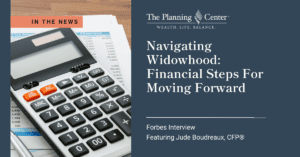So much of the work we do as planners is around clients and their cash flow. There are large spending choices we make (like purchasing homes) that have a regular impact on us every single month for years, and there are other ones that are more invisible short-term purchases that we make on a daily basis (like the mocha coffee I’m drinking right now. It’s delicious and warm, and the temperature just fell 30 degrees overnight here in Chicago. And, yes, I know the benefit of investing that $4 over the long term. Shut up. I’m trying to write here.)
One thing I believe at my core is the importance of understanding those spending choices that affect our ability to have short-term flexibility and long-term choices. The less we seem to be aware of what our goals are, the more mindless we can get with some of our other spending (see mocha reference above).
 While we all have our spending categories of housing and groceries and the like, I think we need to have discussions around spending on things that are restorative. The unexpected word I have found for that is “Play.”
While we all have our spending categories of housing and groceries and the like, I think we need to have discussions around spending on things that are restorative. The unexpected word I have found for that is “Play.”
“The opposite of play is not work – the opposite of play is depression.” – Dr. Stuart Brown
One of my favorite things to ask clients is “Where is Play in your budget?” I often get blank stares back, or things like “We spend thousands on travel to go back and visit my family every Thanksgiving.” That kind of spending may be play, but it could also be categorized as “obligation” or “family guilt” or any number of other things.
So what counts as Play? The answer to that question is different for everybody, and I believe it’s critical for a family’s spending plan. I’ve found that if we spend consciously on play activities for us and our families, there’s less mindless spending on other things.
*Seven Principles of Play:
– No specific purpose – I do it because I like it and not to get a certain outcome.
– Voluntary – Nobody is making me do it, I just want to do it.
– Inherent attraction – Things that make you say, “Yes, I want to do that!”
– Time disappears – Where can you say, “Wow is it really 8 p.m. already?”
– Diminished consciousness of self – Where can you let yourself go and be silly?
– Improvisational potential – Where can you be creative and explore new things, new outcomes, new possibilities?
– Continuation desire – Where do you have more energy when you’re done than when you started?
So what checks off some of those boxes for you? Your partner? Your kids? Some examples I’ve gotten from clients are:
- Yoga Classes
- Time with my Grandkids
- Travel (the fun kind, not the family guilt kind)
- Driving
- Genealogy
Another example for the lucky few is – their work. (I am so fortunate to fall into this category myself. It meets all of the principles of play except the “no specific purpose” one on the list above. And for us lucky ones, it changes the retirement dynamic altogether, which will be another topic for another day).
When we have a sense of what Play is for us and our families, it can change everything about how we do things. Dr. Brene’ Brown (no relation to Dr. Stuart L. Brown) in her wonderful book The Gifts of Imperfection shares the story of how talking about what met their family criteria for play were swimming and time outdoors. So their family vacations shifted from theme parks to renting a lake house, and she described how much that changed their family.
Think about what play is for you, and how you feel after your experiences. Don’t you feel more energized? Refreshed? Ready to take on other more challenging activities?
And yet, we often deny ourselves those things by saying “Those classes are too expensive,” or “I don’t want to take more time away from my kids/partner/dog.” A mentor of mine often says “An empty pitcher fills no cups” and I think that is exactly the issue with Play. Time in personal play activities makes us better, and makes us better for the people we love. Those are exactly the kinds of things we should be spending money on—things we’re willing to make trade-offs for to free up cash for them.
For more on play, Stuart L. Brown’s excellent book Play summarizes much of his research and thinking on the topic (and his TED talk gives a great overview as well.
*Paraphrased from Play by Dr. Stuart L. Brown, published by the Penguin Group, copyright 2009
This article has been reprinted at The Wall Street Journal online here.
 Jude Boudreaux, CFP®, is a Partner and Sr. Financial Planner in the New Orleans and Chicago offices of The Planning Center, a fee-only financial planning and wealth management firm. Email him at: jude@theplanningcenter.com.
Jude Boudreaux, CFP®, is a Partner and Sr. Financial Planner in the New Orleans and Chicago offices of The Planning Center, a fee-only financial planning and wealth management firm. Email him at: jude@theplanningcenter.com.






